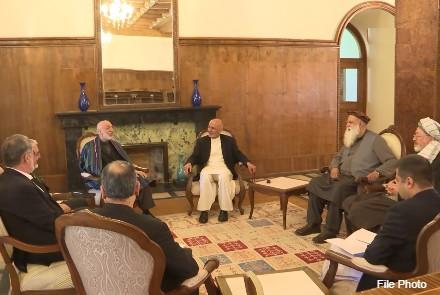Govt to Finalize State Council List by End of Week

The Afghan government is expected to finalize the list of names for the High Council of Government, a formation that will work for building a consensus around peace and on other peace-related affairs at higher levels, according to a source who is familiar with President Ashraf Ghani’s recent meetings with political leaders.
The source said that discussions on finalizing the list of the members of the council are underway and that most of the members are political party leaders.
The political leaders, whose names are on the list, are expected to meet in a grand meeting to discuss the future of peace and war in the country.
The Presidential Palace said that the list is not final and that it has not been decided whether the council will have an advisory role in the peace process or have decision-making authority.
“It has not been finalized about how many parties will be there, what will its name be (of the council), what will be the limits be on its authorities and responsibilities. More consultations are needed. There is an agreement on one thing: that this is a political consensus from around the republic,” said Dawa Khan Minapal, a presidential spokesman.
Two lawmakers said that they see the problem in the limitation of power to some individuals at the Presidential Palace.
“The Presidential Palace is run by four people: Fazli, Mohib, Ashraf Ghani and his wife. These four people are making decisions on Afghanistan. Otherwise, Ashraf Ghani is not consulting with the parliament,” said Shir Mohammad Akhundzada, an MP from Helmand.
“Ashraf Ghani is seeking to be an undisputed president. The people of Afghanistan expect the President to build political consensus and this too, has a cost,” said Abdul Wali Niazi, an MP from Badakhshan.
Sources said that more than 20 influential political figures will have membership of the council, but one member of Hizb-e-Islami said that despite efforts by the president to create the council and build a political consensus around peace, some groups within the government are trying to prevent the formation of the council.
“The council was expected to be formed in eight days. The president started his meetings, but I think there are some groups who don’t see the formation of the council and a political consensus in their favor,” said Humayun Jarir, a Hizb-e-Islami member.
“Anyone who is in favor of peace for real, should not follow division policy,” said Ahmad Wali Massoud, the head of the Ahmad Shah Massoud Foundation and a former ambassador.
Some politicians said that the rift over the removal of the Faryab governor and the new appointment for the province by the president, will affect Ghani’s relation with Abdul Rashid Dostum and that such attempts can harm political consensus.
